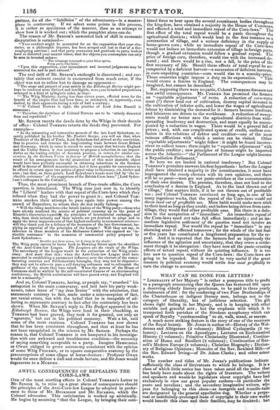AWFUL CONSEQUENCES OF REPEALING THE CORN-LAWS.
ONE of the most startling effects in Colonel TORRENS'S Letter to Mr. SENIOR is, to raise up a great alarm of consequences should the principles of the Anti-Corn-law League be adopted in prefer- ence to those of Mr. Husuisson and Mr. RICARDO, which the Colonel advocates. This vaticination is worked up artistically. He begins by assuming "that the League, by bringing their coin- bined force to bear upon the several constituent bodies throughout the kingdom, have obtained a majority in the House of Commons, and effected a total and immediate repeal of the Corn-laws." The first effect of the total repeal would be a panic throughout the agricultural districts ; which would lead in the first instance to a contraction of tillage, and a serious deficiency in the supply of
home-grown corn ; while an immediate repeal of the Corn-laws would not induce an immediate extension of tillage in foreign parts, though a gradual extension would follow a gradual repeal. The price of foreign corn, therefore, would rise with the increased de- mand ; and there would be a rise, not a fall, in the price of the first necessary of life. Should these effects of total repeal be ac- companied by a deficient harvest—a succession of deficient harvests, in corn-exporting countries—corn would rise to a scarcity-price. Those countries might impose a duty on its exportation. "This would create a famine in England. The consequences may be imagined, but cannot be described."
But, supposing there were no panic, Colonel T0RREN8 foresees not less awful consequences. Mr. COBDEN has promised the farmers an "equitable adjustment" of rents. A reduction of corn-rents must (?) throw land out of cultivation, destroy capital invested in the cultivation of inferior soils, and lower the wages of agricultural labour by diminishing the demand for it : farmers become insolveat,
and labourers are driven to the workhouse. A reduction of money- rents would no better save the agricultural districts from wide-
spreading insolvency and destruction, and must equally be accom- panied by a reduction in wages. There would be a general fall of prices ; and, with our complicated system of credit, endless con- fusion in the relations of debtor and creditor—one of the most ruinous afflictions with which a nation can be visited. Other "equitable adjustments" might follow : it might be found inconve- nient to collect taxes ; there might be "equitable adjustment" with the public creditor ; new principles of honour might be imported across the Atlantic—" the Parliament of the League might become a Repudiation Parliament."
So here we are landed in national insolvency But Colonel TORRENS'S postulate answers his first hypothesis : before the League shall have obtained a majority in the constituencies, it must have impregnated the county electors with its own opinions, and there will be no panic—men are not panic-stricken at the consummation of their own desires. The premiss, therefore does not lead to the conclusion of a famine in England. As to the land thrown out of "tillage," that matters little, if it be not thrown out of profitable use ; and Colonel Tonazas convinced us long ago, in one of his many ingenious works that the repeal of the Corn-laws would not throw land out of proitable use. Mere habit would make men stick to their land as long as they could; and before being driven from corp- tillage, they would find other profitable uses. But there is a delu- sion in the acceptation of "immediate." An immediate repeal of
the Corn-laws need not take full effect immediately ; and an im- mediate legislative settlement of the question need not involve an immediate repeal. Nor would the repeal be "immediate" in any alarming sense if effected tomorrow ; for the whole of the last four or five years has constituted a lengthened preparation for the re- peal. And it is reported that the farmers feel so injuriously the influence of the agitation and uncertainty, that they crave a settle- ment though it be abrogation : they have now all the panic-creating effects of actual repeal, without its quieting influence. It is too late now to question repeal of the Corn-laws : the Corn-laws are going to be repealed. But it would be very useful if the great masters in political economy would settle how most profitably to turn the change to account.


























 Previous page
Previous page